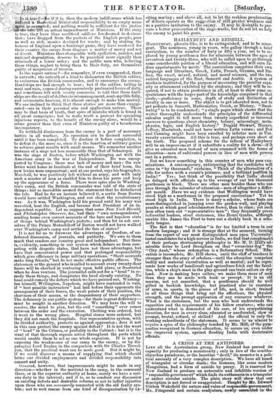HAILEYBURY AND REDHILL.
Thenevutrule pheenix-like; is to be eitingnished, and to be resur- gent. The nominees, young in years, who gallop through a brief curriculum, to the number of forty or fifty a year, are to be re- placed by .young-gentlemen free for admission between the ages of seventeen and twenty-three, who Will be Called upon to go. through some considerable portionof a liberal education, and will earn In- dian appointments by merit. The curriculum comprises their own language and literature, Greek, Latin, French, German, and Ita- lien, the exact, 'mixed, natural, and moral sciences, and the two radical languages Of the East, Smiscrit and Arabic. A system of limns is instituted, for the purpose of measuring the peculiar caper city or attainment ekhibited by the students; and they will be re- quired, if not to obtain piotiMericy in ell, at least to ihow eoine ae- qrtaintanee witlifhe larger part of the knowledge comprised in that eirele,e-proficiency in some, depth of study and distinction of faculty in one ornaore. The object is to get educated men, not to get pedants in &Jesuit; Mathematics, Greek, or History. " &let- tering" is to be condemned; "a single paper which shows that the writer thoroughly understands • the principles of the differential calculus ought to• tell More than twenty eupeifieial or incorrect answers to questions about chemistry, botany, minetalogy, meta- physics, logic;' and English history." Dugaid 'EnteWart, leiornee, Jeffrey, Macintoeh; could not have Written Latin. verses; and Fox and Canning might. have been excelled by infeelor -men iti Uni- versity exercitatiOns: All:thii is true; and perhaps even' short of the truth. The proposed scheme' for• the reform of Itaileybury will be an improvement if it substitute a reality for It shem—if it give us educated men instead of men enunnied with the forms of education—men of cultivated powers in lieu of men with powers cast in a pattern. - But we know something in this country of men who pass exa- minations. A contemporary, anticipating that the Candidates will come in "by thousands," excl.:anis "Think of theitlternattie of e title for orders with a curate's pitieneee and a post-fiat in India!" Yes ; but think of the possibility that India should be deluged with officials up to the average .of our ten thousand gentlemen in bleak. There are other men: besides those who can pass through the colander of eduCatiOn—men of altogether a differ- ent mould. Have we any evidence that Wellington would have stood high as a Marksman in the proposed curriculum ? Yet -he stood high in India. There is Many a scholar, whose feats are more distinguished in jumping over the garden-wall, and playing pranks at which good schoolmasters frown, than in 'class; yet such men often turn out "representative Men"; 'they frequently prove influential leaders, stout statesmen,. like Henn Quatre, although unable' like James the First ,to turn Out a clerkly bbek in a scho- larly tongue.
1- The feet is that "education" is far too limited a term in our modern 'language ; and it is strange that at the moment, turning from the report of our most distinguished men upon University- tested candidates for a high service iti India, we find that complement of their pethaps shoetcoming philosophy in Mi. M. Dellill's ad- mirable letter to Lord Brougham On that "ownerleiteelo,g " the " City Arab," whose redemption is a 'Reformatory Selial: Edu- cation is incomplete, Mr.' Hill shoevs, until the staff of ttliehers stronger than the army of scholars—until the education .eompreeeil bodily and material exereitation as well as Mental; and he reptV sent& -how works of handicraft and agriculture fetch Out the facul- ties, while a ship's mast in the play-ground can train senors on dry land. Now in making boys sailors we make them more of men than they can be 'made with boll or Precept.' It is an old maxim, not yet cancelled, that a gentleman should be well gifted in bookish knowledge, but practised also in exercises of .arms, in sports, in the graces of life' 'and, in short, trained in all those things that bring out the affections, the physical strength, and the prompt application of any resources whatever. What is the statesman, but the min who best understands the capacities and the requirements of his fellow creatures; who can understand what is demanded of his care, of his sympathizing- direction, for men in every class, educated or uneducated, slow or prompt, brutal, refined, or skilled? And the official is only the working subordinate of the statesman. It seems toeiie almost to require a spice of the philosophy toilehed by Mr. ffffl, of the gyrii-- mastics recognized in Germati education, to secure ne; even under the improved system, against flooding India with doctrinaire officials.


























 Previous page
Previous page